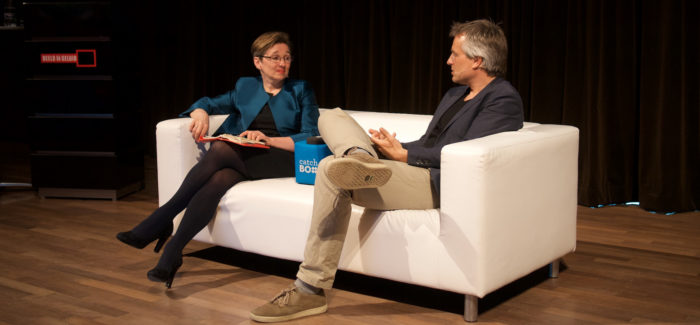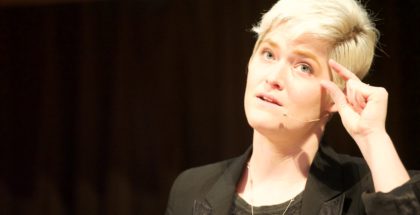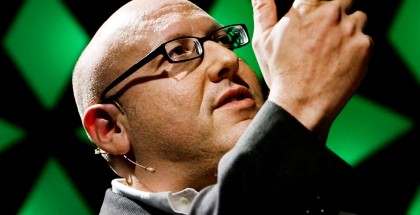‘Life is like a pinball and then you die’ Interview with Joris Luyendijk
Joris Luyendijk is a Dutch-born, London-based writer and journalist. Joris was the last keynote speaker of the first day of Media Future Week. Instead of giving a talk he was interviewed by Monique van Dusseldorp (Moderator). Monique asked him about his carrier, his books and of course the most important; about how he thinks about journalism in a post-truth world.
Even though Joris was a bit tired because of his long day, he talked freely about all kinds of subjects. Questions asked by Monique and participants got great answers. Answers about his personal life, his work and ambition and advice for participants of the Media Future Week. While they set down on a white coach in front of a full hall of students and professionals Joris tells about how it all started.
Joris was born in Amsterdam but grew up in Hilversum. Before he went abroad he thought that humanity was a train all going in the same direction, with the Netherlands on front. Because of that he had the idea that foreigners would come to the Netherlands to become Dutch. During his study in Egypt he found out that it was the complete opposite. They actually felt sorry for him that he was not a Muslim or Arabic. He earned his Master’s degree equivalent “doctoraal” degree in Cairo. His first book ‘Een goede man slaat soms zijn vrouw’ (A Good Man Sometimes Beats His Wife) is about the Egyptian society from a Western observer’s point of view. He interviewed many people in Egypt, also women about this taboo. They have a completely different point of view then western women, his landlady’s son got rejected because he was too emancipated. They would actually think something was wrong if they weren’t beat up by their husbands.
After his time in the Middle East as a correspondent, he was hired by the Guardian to London to investigate the culture of big banks. He found over 200 bankers and banking staff ready to talk freely about all the taboo subjects. What he found was that the real problem is not bad people or bad structures, but bad laws. Banks are actually happy that people see them as ‘villians’, so they don’t have to change their laws.
His latest book ‘Kunnen we praten’ (Can we talk) is more about how the media works. He wrote this book for people who just like him have lost their faith in traditional political parties. According to Joris the trust in the media is gone, that is why people need to inform themselves. So what can you do as a journalist in this post-truth media world? Joris: ‘Journalists should be more open about their constrains. The most important is that journalists pretend they do a lot of things that are actually done for them’. Images play a very important role, that is why television is very dominant. Occupation is a bigger problem than terrorism, but because there are more spectacular images of terrorism acts people think terrorism is far worse. With his books Joris tries to open our eyes and influence us from his own experiences.
His advice to students: Do something that makes you happy, life is like a pinball and then you die ?
Interview with Joris Luyendijk
Livestream Joris Luyendijk
This keynote speaker is made possible by Stadsfonds Hilversum.






